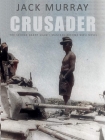Crusader (A Novel of WWII Tank Warfare), Jack Murray [top romance novels .txt] 📗

- Author: Jack Murray
Book online «Crusader (A Novel of WWII Tank Warfare), Jack Murray [top romance novels .txt] 📗». Author Jack Murray
One positive sign was the sounds of war were louder. They wereheading in the right direction. The observation of this amused both of themgreatly.
‘I never thought I’d miss the sound of shelling,’ observedManfred.
‘The sweetest sound in the world,’ agreed Fischer, laughing.
‘I wonder who’s winning?’ said Kohler. This was actually a goodpoint, thought Manfred. Who was winning? They might return to the frontline andrisk being taken prisoner. He stopped any thoughts of defeat. The only way theycould lose is if they did something stupid like attacking a few armoured carswith a squadron of tanks, for instance. Manfred shook his head. Such a waste.
‘Nobody would be my best guess,’ suggested Fischer.
In this he was right. Ahead of them lay day three of one of themost complicated battles in history. Each side had contrived to surround oneanother in an intricate war of attrition brought on by lack of communication,stretched supply lines and poor planning. But the three boys trudged on,unaware of the unfolding mess in front of them.
By now, they were footsore and leg weary. Their youth had takenthem this far. It would be their spirit that carried them the rest of the way.The heat was endurable, but the intensity of the sun made burning an increasingrisk.
‘Let’s go over there,’ suggested Fischer, pointing to a cleft inthe ridge just ahead which could provide some shade from the rays of the sun.They had agreed tacitly to manage their diminishing reserves more carefully.Their next meal would the last. The water would last until tomorrow ifconserved. They’d been walking less than a couple of hours.
Conversation had dried up. None would admit what they werethinking; an overwhelming desire to avoid, at least, one more day of conflict.As they sat in the shade, Manfred saw Fischer look at the photograph of a girl.Unable to stop himself he said, ‘You’re a lucky man. She’s beautiful.’
Fischer burst out laughing. In fact, he was helpless with laughterand Manfred wondered if the desert was beginning to exact its toll.
‘What’s so funny?’ he asked, finally.
‘It’s my sister,’ said
‘Ahhh, sorry.’
‘No, don’t apologise. I know it’s different with you countrybumpkins, but in the city, we tend not to sleep with family members.’
Both Manfred and Kohler erupted into laughter. It is a remarkablefact of life that crude humour can become a crutch for young men even in thedirest of circumstances. The next few minutes passed cheerfully in a bout ofraillery that encompassed exaggerated allusions, both positive and negative, onthe respective attractiveness of each to the opposite sex before moving on toregional rivalries.
‘At least we have culture and education. You’re just a bunch ofuneducated, beer-guzzling sausage stuffers; too drunk to handle the poor womendown there.’
‘I defer to your experience,’ said Fischer, making a mock salute.
Manfred decided to move the topic on. This was certainly not anarea that he’d great experiences to share.
‘How far do you think we’ve walked?’
Fischer looked at his watch and made a swift calculation.
‘Ten to twelve kilometres.’
Kohler stood up and climbed onto a clump of rocks and stared outat the never-ending plain broken only by the occasional wadi-bed. He shook hishead as Manfred raised his eyes hopefully. ‘How long do you think we shouldstay here?’
‘I was thinking about this,’ replied Fischer. ‘My guess is that weare at least another ten to fifteen kilometres from our lines. I am assuming,of course, we are on our side of the airfield. If you think about it, our gunscan pick off the Tommies from four kilometres away. The guns will be screeningour tanks, so they are further back. We can’t be more than three or four hourswalk away. This is nothing,’ replied Fischer, airily.
Three hours sounded a lot to Manfred, thinking about the blisterson his feet. Each step was increasingly painful. It wasn’t just his feet. Thepain in his heel and toe had forced him to change his walking gait. The resultof this change was to strain rarely used muscles causing cramp. Thankfully, he’dbeen able to avoid collapsing on the ground but that would not be far away, nomatter how long they rested.
There was a tacit acceptance that they should wait until thelatter part of the afternoon before setting off again. The sounds of war werebeginning to peter out when they resumed their walk. The guns remained theirguide, though. The heat was definitely more bearable now.
Time dragged.
The sun could still burn but there was probably another two hoursof light. They could manage that, so they set off again. The remaining daylightwould give them sufficient time to reconnect with the rest of the army or, atleast, have visibility. The rest had helped their mood if not Manfred’sconcerns about his legs. After walking some way, Fisher noticed the strangenessof Manfred’s gait.
‘What’s wrong?’ asked Fischer.
‘Blisters,’ said Manfred.
Fischer nodded and replied, ‘I can feel two coming also.’ As hesaid this, he heard a particularly loud explosion. They were getting nearer. Towho, God only knew.
Manfred grinned and indicated the direction of the loud boom,‘Could be worse, I suppose.’
‘True.’
The proximity of the battle was now uppermost on their minds. Theywere obviously getting closer but could not see anything as the valley was notan entirely flat plain. There were ridges that denied a full view of thehorizon. Soon, they could see a pall of black smoke rising into the sky.
‘What are the chances we meet our boys or theirs?’ asked Fischer.It was more rhetorical, but Manfred had been thinking about nothing else.
‘We should be on the right side of the battle. My only worry isthat the desert is swarming with British. They come behind our lines. They callit the Long Range Desert Group.’
‘Yes, I’ve heard of them,’ replied Fischer. He could think ofnothing to say about them, so the subject dropped. They trooped along insilence. The sounds of





Comments (0)